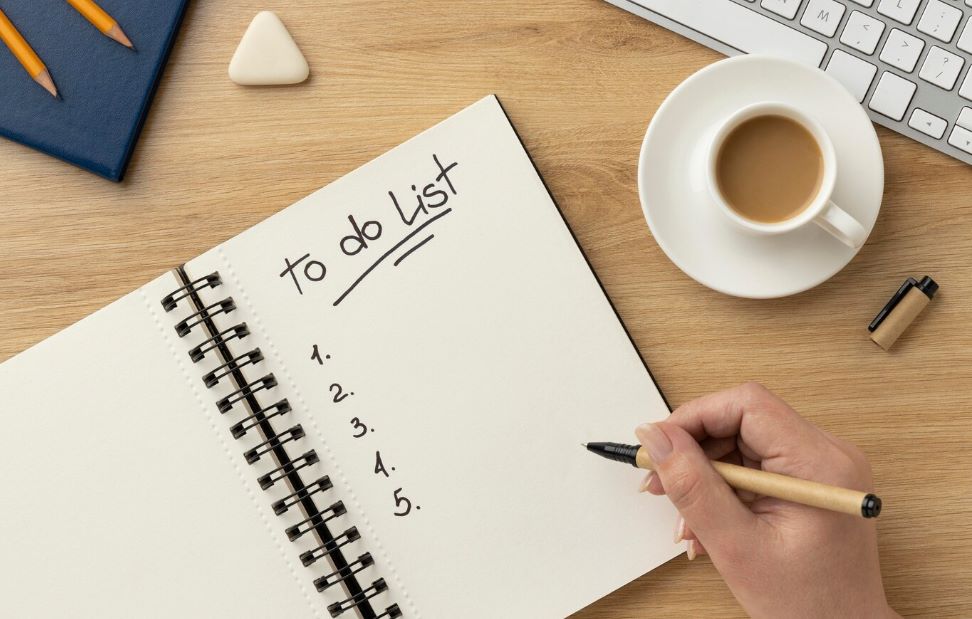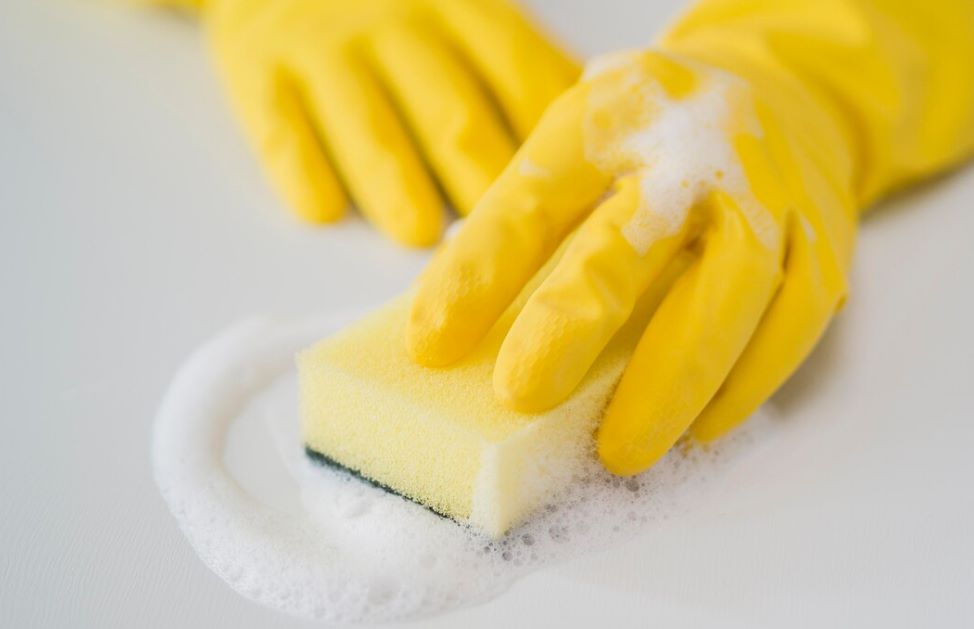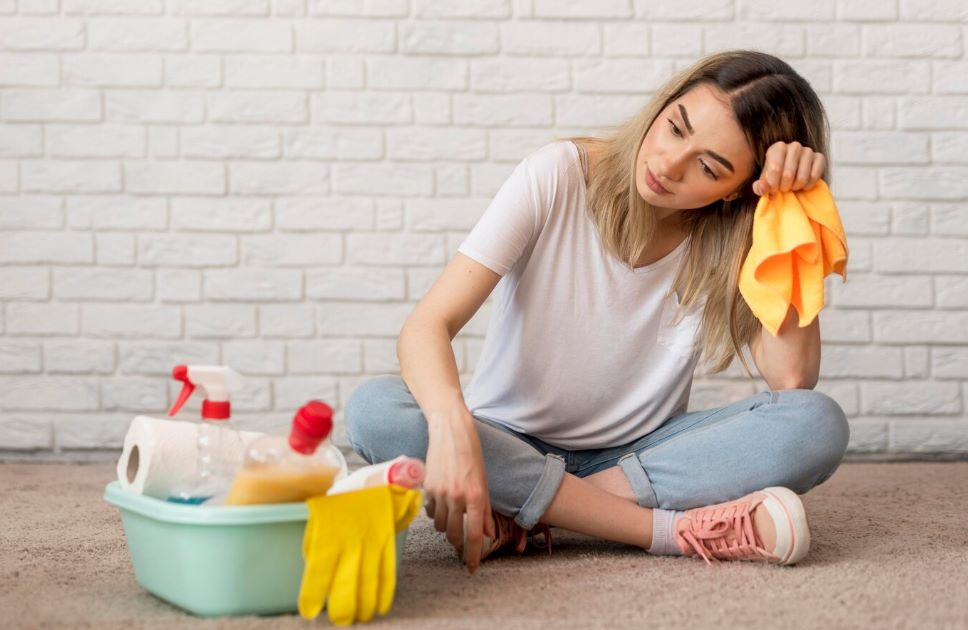Although cleaning your home may appear simple, you may have many questions once you start thinking about it. How exactly does one go about sanitising a lavatory? We'll pare it down until it's something everyone can do and the results are obvious and immediate. If you start cleaning, you can only stop once every room is spotless.
Making a Strategy
Think About How Clean You Want Things To Be And How Much Time You Have Available.
With this knowledge, you may organise your cleaning schedule more efficiently. Being truthful with yourself about your skills, time, and motivation is crucial.
- Start at the top and work your way down. It's inefficient to dust or vacuum the bottom of an item, knock more dust to the floor, and then dust the top. When time is limited, focusing on less critical chores is advisable.
- The "average" busy person should do a small amount of cleaning once or twice a month and avoid letting work pile up by doing a little bit each day. When living alone, you can design your space as you see fit.
- Keep an eye on the exhaust fan and the tops of the kitchen cabinets; they collect grease and dust and need to be cleaned regularly but infrequently. Upper kitchen features attract dust and insects due to grease and filth buildup.
Create A To-Do List And Strategy.

Determine the order in which you will clean the rooms (often, "back to front door" is the best). This will speed up the cleaning and prevent duplication, especially if multiple people are engaged.
- The cleaning procedure can be carried out in whatever sequence you like. This will serve as a pre-written checklist for your convenience.
- Organise your time so you don't have to switch gears mid-cleaning or repeatedly do the same item.
Attempt To Divide Up The Labour.
If you live with others, keeping the house tidy shouldn't lie solely on your shoulders. Establishing a cleaning schedule based on shifts requires you to take the initiative, but doing all the scrubbing by yourself is preferable.
- Please make sure the tasks assigned are age-appropriate; for instance, an elementary school student could be requested to pick up the floors of their bedrooms, while a teenager could be tasked with cleaning the garage or the bathroom. For instance, arrange monthly coffee table organisation to avoid scheduling monthly toilet cleanings.
Bathroom Cleaning
Empty And Scrub The Toilet.
Having to clean the toilet is a chore that should be avoided. Rubber gloves keep bacteria and grime away. Scrub the bowl with a sponge and hot water to release stains or grime. Do something else with the bowl while it soaks in the hot water.
- Squirt acidic toilet cleaning into the bowl and rim. Soak it for 10 minutes, and then use the brush to clean it. If you're done using it, flush it after you're done. After scrubbing the bowl thoroughly, spritz it with bleach, let it soak for 5 minutes, and then scrub it again.
- To finish up, give the toilet a thorough, firm scrub with pumice to remove any remaining calcium, hard water, or other stubborn stains. To further lighten the atmosphere, a magic eraser could be utilised.
- After using the bowl, put the used parts back on the exterior. Cleaning them with a disinfectant spray and paper towel or cloth removes bacteria.
Shower Or Bathtub Cleaning.
It's no secret that bathrooms with showers quickly become unsanitary. You can get the job done using only a cleaner for the shower, a bristled brush, and some muscle. If you don't have a shower cleaner, you can remove soap scum from the bottom of your tub using dishwashing liquid.
- Antibacterial cleaners like Lysol should be used as the final stage in any cleaning process.
- Use car wax to maintain a clean shower for longer. A glass gallon may be cleaned effectively with half a cup of ammonia and eight drops of dish soap.
Sink Cleaning
Even though most sinks are tough, it's still a good idea to do a spot test to ensure the cleaner doesn't ruin the finish. Once you're sure it's safe, spray it down. After waiting a minute, eradicate any leftover mould or germs with brute force and a thick sponge. To make it shine, rinse it in warm water and then dry it with a clean cloth or paper.
- If a stain is very stubborn, brushing at it may help remove it. Brushes with wire bristles are foolproof.
Wash The Windows And Mirrors.
Many people assume that glass cleaner works because of this myth. Its principal function is ornamental rather than sanitary. Soapy water is preferable to plain water if your mirror is especially dirty. How to clean glass surfaces properly is outlined below.
- Start by using dish soap and hot or lukewarm water on a sponge, rag, or squeegee to wipe your glass. Powdered no-scratch cleaner is ideal for glass, mirrors, ceramics, and metals because it removes hard water residue without hurting the surface.
- Cleaning glass using vinegar and water, then drying with a lint-free towel and wiping with newspaper is a green option. No striations can be seen. You'll need to use a lot of elbow grease to clean glass effectively.
- Wipe the glass with a paper towel sprayed with glass cleaner. Because it forms a barrier against dirt and liquids, glass cleaner makes cleaning a breeze. If you don't know what you're doing, glass "cleaner" can leave streaks. Use newspaper if you want a streak-free finish on your glass after washing it.
Health Benefits of Home Cleaning
Improves Health And Well-Being
Keeping one's home clean regularly reduces one's risk of getting sick and allows one to live a more hygienic lifestyle. Maintaining hygiene practices also helps stop the spread of disease-causing bacteria.
Prevents Allergies
Many common household bacteria are aeroallergens that can trigger rhinitis, asthma, and chronic sinusitis in home dwellers. Also, allergens like dander, pollen, dust mites, etc., can lead to a stuffy nose, irritated skin, watery eyes, a hacking cough, and other respiratory difficulties. People with severe allergies and respiratory problems are less likely to live in filthy dwellings with no mould and few allergens.
It's A Great Way To Boost Efficiency.
People living in clean homes are less likely to get sick, which is good for everyone's productivity at home, school, work, etc.
Thus, personal and household hygiene might boost your and your family's productivity. Insist that everyone does their share to keep the house clean and germ-free for everyone's health.
Safer Conditions Are Maintained.
Because fires, toppled objects, and tripped-and-fallen-on-body parts are all increased in filthy homes compared to clean ones, it stands to reason that the former is safer. In addition, if you clean and tidy your home regularly, unused or forgotten chemicals are less likely to contribute to air pollution, which could aggravate a family member's respiratory condition.
Positive Mental Health Is Maintained.
Stress reduction from a clean, clutter-free home improves mental health. Keeping your home clean and organised might help you feel better mentally. Reputable end-of-lease cleaners say that some people find cleaning and decluttering therapeutic.
Keep The Pests Out!
Pests pose a health risk by polluting food sources and creating unsanitary living conditions. As a result, paying close attention to every corner and crevice while you clean is crucial, as clean homes are less prone to attract pests.
Carelessness in Cleaning That Leads to a Dirtier Home
Using Unclean Equipment To Clean
You can only expect results from your cleaning practice if you use effective tools. To prevent spreading germs, grime, and dust around the house, check the condition of your cleaning supplies before getting started. Regular washing of cleaning utensils and equipment is essential for preventing the spread of germs. If you want to get the most out of your vacuum cleaner, empty it as soon as it fills up, and wash or replace the filter regularly.
Putting Disinfecting Ahead Of Cleaning
Cleaning and disinfecting are two different processes, and knowing the difference between the two is crucial. Disinfecting employs chemicals to eliminate germs, while cleaning only removes them physically. Cleaning is necessary before disinfecting because dust and filth prevent the disinfectant from targeting microorganisms. To maximise the effectiveness of the disinfectant, wipe off the area thoroughly before applying the spray.
Wiping Surfaces Too Soon
It can be more challenging than spraying some cleaner on a surface, wiping it down, and calling it clean. Disinfectants need time to do their job, so be patient. To successfully eradicate germs, the surface may need to be visibly moist for several minutes. Before using a sanitiser or disinfectant, it is important to check the label to see how long the product should remain in contact with the surface.
Sponges For Surface Cleaning:

Don't just grab a sponge and start wiping off the counters. Sponges used in the kitchen are renowned for spreading germs to adjacent surfaces. Avoid spreading germs by disinfecting and replacing your sponges approximately once a month or using clean microfiber cloths to wipe down surfaces.
Scrubbing The Glass On A Sunny Day
If you want to see what you're doing, cleaning the windows should be done when the sun is out. However, the inverse is the case. The rapid evaporation of glass cleaner in the hot sun will leave streaks. Plan your outing for an overcast day with temperatures below 70 degrees.
Cleaning Electronics Using A Spray Cleaner:
Never clean your TV, cell phone, or LCD screen with a spray cleaner. Like the wood fibres in paper towels and tissues, they can cause harm. Suppose you don't have a microfiber cloth; a coffee filter will do in a pinch. Use rubbing alcohol if you need a cleaner with a little more muscle. Never direct the spray at the screen; aim for the cloth instead.
Conclusion
To clean a house quickly and well, you should think about how clean you want it to be and how much time you have. To begin, make a cleaning plan and focus on tasks that aren't as important. People who are busy should only clean a little bit once or twice a month. Keep an eye on the kitchen drawers and exhaust fan because they get dirty and full of grease. Make a plan and to-do list to speed up the cleaning and avoid doing the same things twice. Make sure the jobs are right for each child's age and divide up the work.
When you clean the bathroom, you have to empty and scrub the toilet, flush it, spray it with bleach, and give it a good scrub with pumice. Cleansing spray and a paper towel or cloth can also be used to get rid of germs.
A cleaner, a bristled brush, and strength are needed to clean a shower or bathtub. As a last step, you can use an antibacterial cleaner like Lysol. To keep the shower clean for longer, you can use car wax or vinegar.
When you clean a sink, you have to test a small area to make sure the cleaner doesn't damage the finish. Rinse and dry the sink, then use wire bristles to get rid of tough spots. If you do these things, you can make your home clean so that everyone can enjoy it.
Dish soap, hot or cold water, vinegar, and water are the right ways to clean windows and mirrors. For a finish without streaks, spray glass cleaner on a paper towel and use it to clean the glass. Cleaning your home on a regular basis lowers your risk of getting sick and encourages you to live a clean life. It also stops asthma and makes things run more smoothly by stopping mould and other breathing problems.
When homes are clean, there are fewer fires, broken things, and air pollution. A clean home not only lowers stress but also keeps pests away, which is good for your mental health. As you clean, be careful not to make the house dirty.
Don't use old tools; instead, use tools that work well. For disinfectants to work best, they need to be used before they can be cleaned. To stop germs from spreading, don't wipe down sides too soon. Disinfectants need time to work, so wait and read the package before you use a scrub or disinfectant.
To keep the windows from getting spots, clean them when the sun is out. Pick a day with clouds and temperatures below 70 degrees to do your cleaning. Do not use spray cleaners on TVs, cell phones, or LCD screens because they can damage them. If you want a stronger cleaner, use a coffee filter or rubbing alcohol instead. Aim for the cloth instead of the screen at all times.
Content Summary
- Learn effective ways to clean a house with tangible results.
- Streamline house cleaning for optimum outcomes.
- Make a cleaning strategy tailored to your needs.
- Understand how clean you desire your space to be.
- Organise cleaning schedules for efficiency.
- Evaluate your cleaning motivation and skills.
- Always start cleaning from the top and progress downwards.
- Allocate regular short cleaning sessions for busy individuals.
- Regularly clean exhaust fans and top kitchen cabinets.
- Prevent dust and insect accumulation in upper kitchen areas.
- Create an efficient to-do list for cleaning tasks.
- Prioritise cleaning rooms from back to front door.
- Avoid cleaning redundancies and save time.
- Plan cleaning sessions to prevent task switching.
- Divide cleaning tasks among house members.
- Ensure cleaning chores are age-appropriate.
- Regularly clean and disinfect toilets.
- Use rubber gloves for hygienic toilet cleaning.
- Consider using pumice for stubborn toilet stains.
- Regularly clean showers and bathtubs.
- Dishwashing liquid can effectively remove soap scum.
- For a lasting, clean shower, consider car wax.
- Always test cleaners on sinks to avoid damage.
- Effectively clean sinks with the right force and tools.
- Brushes with wire bristles can tackle stubborn sink stains.
- Learn the right way to clean windows and mirrors.
- Utilise dish soap for effective glass cleaning.
- Use vinegar for a green glass cleaning solution.
- Newspaper ensures a streak-free finish on glass surfaces.
- Regular house cleaning promotes improved health.
- Prevent allergies by eliminating household bacteria.
- Cleaning can enhance overall productivity.
- Regular cleaning ensures safer living conditions.
- A clean home fosters positive mental health.
- Prevent pest infestation with thorough cleaning.
- Ensure your cleaning equipment is clean to avoid contamination.
- Understand the distinction between cleaning and disinfecting.
- Proper cleaning paves the way for effective disinfection.
- Allow disinfectants adequate contact time for efficiency.
- Ensure regular disinfection or replacement of kitchen sponges.
- Avoid cleaning windows on hot, sunny days.
- Never use spray cleaners directly on electronics.
- Microfiber cloths are ideal for surface cleaning.
- Ensure a clutter-free home for mental wellness.
- Maintain hygiene practices to deter disease-causing bacteria.
- Tailor your cleaning strategy based on your living situation.
- A clean home minimises the risk of respiratory conditions.
- Ensure disinfectants remain on surfaces for the recommended duration.
- Store unused chemicals safely to prevent indoor pollution.
- Cleaning and decluttering have therapeutic benefits for many.
Frequently Asked Questions About Cleaning
Use a mixture of water and mild dish soap for regular cleaning. For disinfection, apply a solution of water and bleach or a disinfectant recommended for kitchen use.
Scrub with a mixture of water and white vinegar or use a commercial mold and mildew cleaner. Ventilation is key to preventing their return.
Wipe down with a microfiber cloth and a mixture of water and mild dish soap. Polish with a few drops of olive oil for a shiny finish.
Regularly declutter by getting rid of items you no longer need. Establish designated spaces for everything and develop a habit of returning items to their places.
Use eco-friendly cleaning products, consider making your own cleaning solutions with natural ingredients like vinegar and baking soda, and reduce water and energy consumption during cleaning by using efficient techniques.
